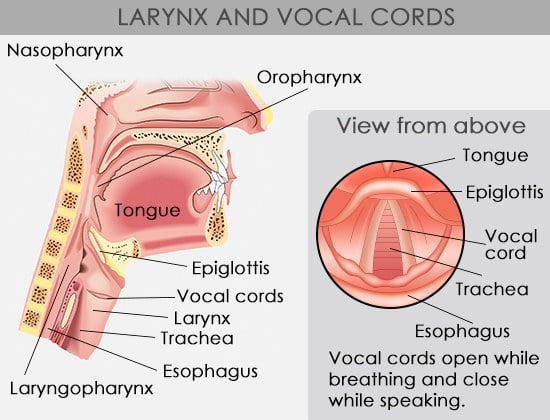
Maintaining good vocal health and hygiene is a goal we should all aspire to—even if we don’t sing or speak for a living.
The vocal folds (“vocal cords”) are a muscular body with a mucosal cover. When we force air through these structures, they vibrate, producing sound. The vocal folds are located inside the larynx, an organ inside the trachea (“windpipe”).


https://bodytomy.com/what-is-function-of-vocal-cords
Keep Your Voice in Shape: 10 Do’s and Don’ts
DO’S
-
Do stay hydrated.
Keeping the vocal folds covered with the right amount of mucosal lubrication is key to vocal health. Drinking 6–8 glasses of water daily helps keep this lubrication present but thin, which is ideal. Herbal tea is good, as are fruits high in water content. But caffeinated beverages are less optimal sources of fluid because they can be mildly dehydrating.
-
Do warm up your voice before extensive use.
If you are going to sing, give a presentation, or even talk on the phone for an extended period, it’s a good idea to warm up the voice by humming, trilling, or singing scales.
-
Do take “vocal naps”.
Rest your voice periodically, especially after yelling at a concert, shouting from a podium, or otherwise overusing your voice. If your job involves talking on the phone all day, then rest your voice for ten minutes every two to three hours.
-
Do use natural throat products.
What helps the throat can help the voice. Look for lozenges, tea, and throat spray that have slippery elm, a great throat lubricant. Licorice and marshmallow are also good for reducing inflammation. Instead of sugar, choose products with glycerin and honey. Menthol is a common ingredient of throat products but it’s drying, so it’s not as beneficial.
-
Do use a humidifier
This is important especially if you are sick or if you live in a dry environment.
-
Do consider the possibility of acid reflux.
If your voice is chronically hoarse, it could be a problem with acid reflux. Consult a doctor if you have a chronically hoarse voice, but don’t have symptoms of heartburn.
DON’TS
-
Don’t strain your voice.
Avoid yelling and shouting; use a microphone (or megaphone) when appropriate. Speak from your diaphragm instead of your throat. In loud environments, minimize talking, or position yourself right next to the person. Even whispering can be damaging because if you want a whisper to be heard, you have to force air through narrow vocal cords.
If you’re sick, go easy on your voice. Using your voice when you have laryngitis can do damage. If you have to cough and sneeze—try to do it gently, whenever possible.
-
Don’t clear your throat too often.
Clearing the throat causes the vocal folds to rub together. This can cause irritation and swelling, which brings more saliva and mucous to the vocal cords, necessitating more throat clearing. When you feel the need to clear your throat, instead try coughing once, swallowing hard, or sipping water. Or you can clear it silently and gently.
-
Don’t smoke—or if you do, quit.
Smoking anything is irritating to your throat—the chemicals, the heat, all of it. Irritation from smoking can lead to chronic laryngitis and vocal fold polyps, not to mention cancer.
-
Don’t use medications that are drying.
Antihistamines and decongestions can have a drying effect that is harmful to the vocal folds. Many other drugs have the side effect of dry mouth/dry throat—so avoid these when possible.
FAQs About Vocal Health
Q: How do you make your vocal cords stronger?
A: You can strengthen your vocal cords by practicing consistent, healthy vocal technique. Warming up the voice is essential before hitting those high notes. Hydration is key as well. Rest your singing voice after intensive practice sessions or performances.
Q: What can ruin your voice?
A: All the actions listed under “Don’ts” in this post can damage vocal cords—especially straining the voice through overuse. Pay attention to warning signs, such as hoarseness and reduced vocal range. Be sure to learn proper vocal technique and practice the “Do’s” in this post.
Q: What drinks help vocal cords?
A: Water is the best fluid for vocal cords, perhaps with a squeeze of lemon. Herbal tea is good, especially teas containing licorice root. Add a spoonful of honey. But caffeinated tea, coffee, beer, and soda are less optimal sources of fluid because they can be mildly dehydrating.
For vocal health strategies customized to your own body’s needs and issues, consider meeting with a speech-language pathologist (SLP). SLPs are experts in assessing, diagnosing, and treating disorders of the voice, as well as issues with speech, language, social communication, cognitive communication, swallowing, and more.
The University of St. Augustine for Health Sciences (USAHS) offers a Master of Science in Speech-Language Pathology (MS-SLP). For students with a bachelor’s degree in a field other than communications sciences and disorders (CSD) or SLP, we offer SLP leveling courses for completing the necessary pre-requisites to enter the graduate program.
References:
Belin, Gayle M., M.A., CCC-SLP. “Tips for Vocal Hygiene.” Accessed January 20, 2022. https://www.gaylebelinslp.com/vocal_hygiene.html. Accessed: January 26, 2022
Live Science Staff. “10 Tips for a Healthy Voice.” Live Science. April 17, 2006. https://www.livescience.com/4078-10-tips-healthy-voice.html. Accessed: January 26, 2022
Simpson, Blake, M.D. “General Voice Care/Vocal Hygiene.” UT Health San Antonio. 1996. https://uthscsa.edu/oto/voice.asp.
Childs, Leslie, M.D. “Voice Care: Sorting fact from fiction.” UT Southwestern Medical Center. April 14, 2016. https://utswmed.org/medblog/vocal-cords-care-qa/ Accessed: January 26, 2022








